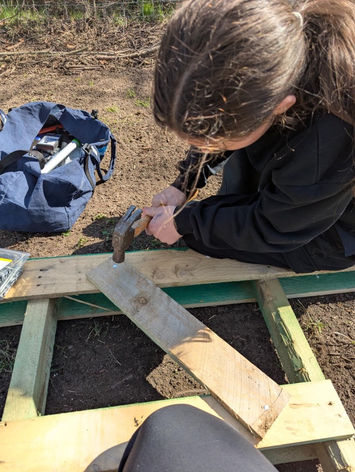


Forest School

Why do we teach Forest School?
Forest school is an outdoor educational programme and intervention that focuses on giving our students the opportunity to learn and develop in natural spaces. The learning process is built upon practical active learning, and students explore the wonders of nature through a hands-on approach. Forest school can help to develop a love of the outdoors alongside a lifelong appreciation of the natural world.
Little Kinvaston School places high importance on holistic development at forest school and students benefit from participation in many ways through the curriculum offer. Examples include the learning of traditional forest school/outdoors skills such as fire lighting, structure building, knot tying etc. Furthermore, students learn life skills such as cooking and first aid. Forest school is also fantastic in ensuring both EHCP targets are met. Pupils with SEMH needs, communication and interaction needs, and physical and sensory needs can all benefit from their time at forest school and as a result, the experience allows them to flourish in other parts of their education.
Intent
At forest school, we endeavour to develop a range of skills such as spiritual, intellectual, physical and communication. The delivery of the forest school curriculum is broad and ambitious. Staff adopt a relational approach, are aspirational in relation to achievable goals and learners who attend make good progress. Positive experiences ensure that pupils can associate forest school with optimistic thoughts, feelings, and emotions and the aim is that they replicate this in other parts of their education.
Impact
At Little Kinvaston School the aim of our forest school session is to support our students to feel more positive and motivated about other educational provisions they are a part of. The activities on offer ensure that:
-
Students develop a deeper love of learning and have more confidence in themselves.
-
Students enjoy the outdoors more and become more likely to engage in outdoor clubs and activities outside of school hours.
-
EHCP targets are met and students with SEND achieve best possible outcomes.
-
Students can navigate through personal relationships with more ease, being able to form, build and maintain positive relationships with others.
-
Students are equipped with important life skills, outdoor skills, and transferrable skills.
-
Students have greater levels of resilience and can work better in teams.
-
Students experience how forest school links with other aspects of the national curriculum and can use this information to apply that knowledge better.

![].jpg](https://static.wixstatic.com/media/4eddf1_1f8ef5df98694e36846e8280af1421eb~mv2.jpg/v1/crop/x_5,y_5,w_141,h_141/fill/w_108,h_108,al_c,q_80,usm_0.66_1.00_0.01,enc_avif,quality_auto/%5D.jpg)





